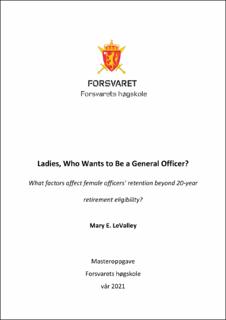| dc.description.abstract | This thesis covers the topic of retention of women in a male-domintated, hierachical, military organization. explored 14 areas of policy that have changed since 2016 that may or may not have significant impacts on mid grade Marines’ retention choices. Nearly 18 percent of all DoD servicemembers are women, yet only eight percent of Marines are women. Since women were first allowed by law to attain to the rank of General Officer in the mid-1970s only about 12 women out of hundreds of Marine Corps General Officers (GOs) attained the ranks of Brigadier General, Major General, or Lieutenant General. While other services have promoted several women to the rank of General, the Marine Corps has yet to promote a woman to 4-star General. The Commandant of the Marine Corps has Talent Management as one of his top three priorities for the Corps, particularly the talents of women and other minorities. Given these facts, it seems that the playing field is wide open for more women to aspire to the highest ranks. I searched the literature to understand the metaphor of the labyrinth with barriers that still inhibit women from continuing and excelling in male dominated organizations. Historically, women Marines have seen their share of organizational structure and culture changes that have influenced how they shape their identities. This thesis gave six professional women field grade officers in the ranks of Major, Lieutenant Colonel, and Colonel serving over 20 years time in service in the active component Marine Corps an opportunity to have a voice and share their gender perspectives through individual qualitative interviews asking about these 14 areas of policy change and the affects on their retention decisions. Then, I held the results up against organizational theories and identity theories to gain a greater depth of understanding into the cultural and personal factors that affect retention. I found that these women have a passion for the Marine Corps and perseverance, yet the areas of physical fitness, health, working hours, inclusion, and occupational specialty limitations were the greatest challenges to their promotion to the GO ranks; while empathetic, engaged leaders and the opportunity to contribute and mentor were some of the most rewarding factors towards continuation to max retirement, regardless of rank. | en_US |
